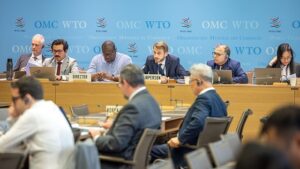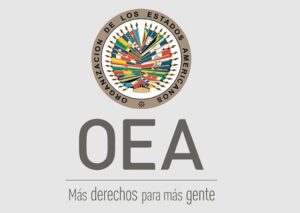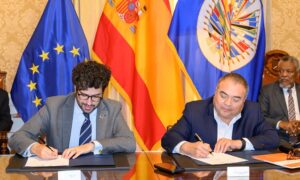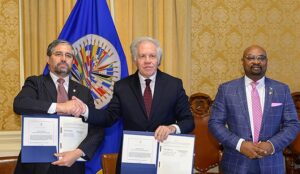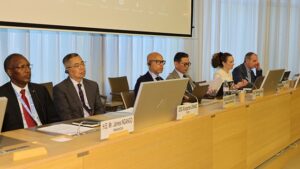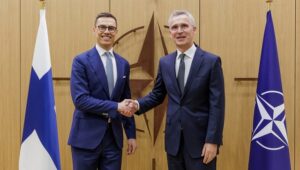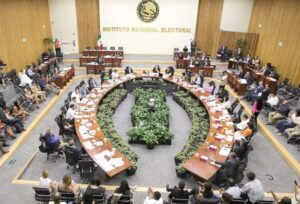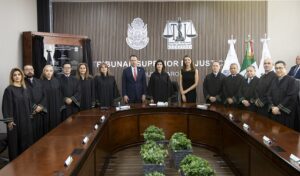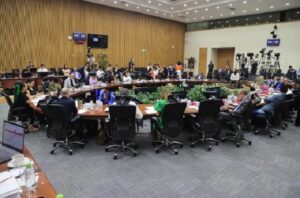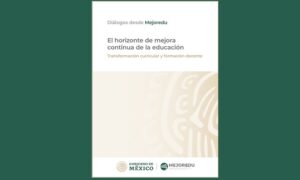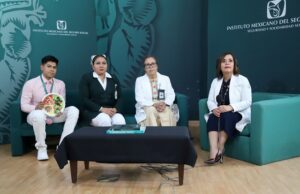DGA Ellard: para resolver la crisis se necesitan más cooperación, más comercio e instituciones más sólidas
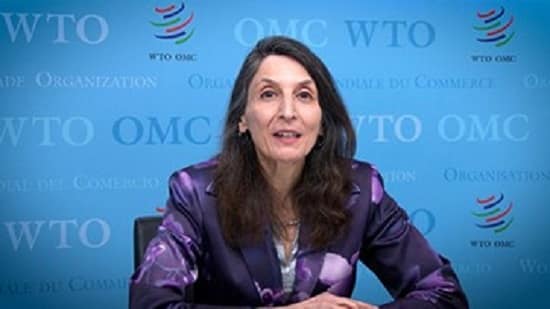
En las observaciones introductorias que formuló en la Séptima Conferencia de Primavera Anual relativa a la Ley sobre Crecimiento y Oportunidades para África (AGOA), celebrada el 19 de abril, la Directora General Adjunta Angela Ellard habló de la triple crisis ocasionada por la COVID-19, los conflictos y el cambio climático y del modo en que el comercio y la OMC podían hacer frente a estas amenazas. También manifestó el apoyo de la OMC a la integración regional de África en el marco del Acuerdo por el que se establece la Zona de Libre Comercio Continental Africana (AfCFTA). A continuación figura el texto completo de sus observaciones.
(de momento sólo en inglés)
Good morning, ladies and gentlemen. It is a great pleasure to be with you today, albeit virtually. I have participated in this Conference many times in my previous role as Chief Trade Counsel at the Ways & Means Committee, and I am delighted to share my views with you again, this time from the WTO’s perspective.
We live in the world of polycrisis. The COVID-19 pandemic exacerbated global income inequality, both within and between countries, and set back economic progress by a decade or more. The war in Ukraine has triggered a sharp spike in energy prices and an alarming food security crisis. And all this occurs against the backdrop of climate change, the single biggest existential threat facing humanity.
So, I would like to speak about the three separate but interrelated crises, the three Cs that have upended our lives — COVID, conflict, and climate — and how trade and the WTO can help tackle them.
After two years of the pandemic, we now have a relatively steady supply of vaccines. But access to vaccines and vaccination rates remain inequitable. According to the WHO, only 15% of Africans have been fully vaccinated, and 15 African countries have vaccinated less than 10% of their population.
And although the number of new cases has decreased, we’re not out of the woods yet. The longer the virus circulates freely in parts of the world, the more likely it is that dangerous new variants will emerge and spread. This poses not only public health risks, but economic ones as well.
COVAX has been essential to supplying Africa with vaccines. But ultimately a continent cannot be dependent on imports and donations. The establishment of the mRNA vaccines hub and transfer of technology to six African countries is an important first step in establishing manufacturing capacity in Africa. Moreover, the AfCFTA can facilitate vaccine manufacturing supply chains in Africa by increasing production capacity as well as promoting economic diversification and technological development.
At the WTO, we have been acting on the pandemic in two streams. Under the first stream, we’ve worked with a small informal group of key ministers to converge on a meaningful and acceptable proposal regarding intellectual property and vaccines to be referred to the entire membership for consideration. Their discussions have focused on practical ways of clarifying, streamlining, and simplifying how governments can enable diversification of production of COVID vaccines, without the right holders’ consent. This represents a practical problem-solving approach responding to the concrete obstacles encountered in charting the pandemic response since the original waiver proposal was tabled. We are continuing our work to cement this outcome.
The second stream of our pandemic work concerns the trade-related aspects of the pandemic response, such as trade facilitation, export restrictions, and regulatory cooperation. Members are working in various configurations to narrow down the differences. In the meantime, the WTO Secretariat has done considerable and well-regarded work to provide key information and to bring together government policymakers and business decisionmakers. This research and analysis has uncovered supply chain bottlenecks and identified trade liberalization measures to ease manufacturing and distribution barriers.
Let me now turn to the second “C” — the conflict between Russia and Ukraine and its impact on global trade. The immense suffering and loss of life in Ukraine are on a scale not seen in Europe since the end of the Second World War. It is clear that Ukraine will bear the heaviest economic burden of the war, from the farmer who has seen his harvester destroyed just as he was going to reap his crop, to the mother who scrambles to find food for her child.
But the severe economic tumult will reverberate far beyond Ukraine’s borders. The double punch of the pandemic and the war has disrupted supply chains, depressed economic growth, and slashed expectations for trade expansion.
Our WTO economists project that global trade growth this year will be drastically cut from the 4.7% we forecast last October to 3%. The situation is very fluid, and this projection could deteriorate further.
The most pressing trade issue confronting us now is food security. Even before the war began, food prices were already historically high, mostly due to the pandemic. Low-Income Food Deficit Countries had already seen their food bill rise by 20% in 2021. The war has made it virtually impossible to export foodstuffs from many ports in the Black Sea region, and fertilizer prices are at record highs.
The UN estimates that as many as 1.7 billion people are “highly exposed” to the cascading effects of the war on global food, energy, and finance systems. Dozens of poor countries and tens of millions of people in Africa, Asia, and the Middle East that purchase a large share of their wheat, sunflower, maize, and barley from Ukraine and Russia. The 35 African countries that depend on food exports from the Black Sea face the prospect of a devastating spike in food prices.
To avoid an economic calamity, we need more cooperation and trade, not less. We must avoid panic buying, hoarding of food supplies, and export restrictions. Importers must adapt their sourcing patterns and adjust production technologies. Suppliers must ramp up production. And transportation companies must adjust routes to ensure that increased production can reach consumers.
The WTO has an important role in monitoring trade flows for our members, ensuring transparency across the supply chain, demonstrating trade liberalizing measures, and providing a forum for discussing export restricting measures adopted by members. Our Trade Facilitation Agreement, which has proven its utility during the pandemic, can help simplify customs procedures and increase trade efficiency during this crisis as well.
Let me now turn to the last “C” — the climate change. The IPCC’s latest Report on climate change mitigation has been seen by many as the “last warning” before key Paris Agreement goals fall out of reach. We need to act now to save the planet and our future. And we know that Africa is particularly vulnerable.
The report confirms that, while international trade does contribute to global emissions, it is also part of the solution. We realize that the WTO is not the place to establish global climate policy and how to reach these goals. But WTO rules govern taxes, tariffs, subsides, regulatory measures, and other instruments that are highly relevant for implementing climate policies.
I would like to highlight two ways in which trade and the WTO can help.
First, to transition to a low-carbon economy, countries need affordable access to advanced technologies, and open trade plays a critical role in providing such access. Lowering barriers to trade in environmental goods and services helps facilitate technology transfer for climate change mitigation and adaptation.
An average tariff on environmental goods is relatively low, particularly in developed economies. But some environmental goods are subject to very high tariffs. To transition to a low-carbon economy, countries, particularly developing countries, need affordable access to advanced technologies. The WTO can help by reducing tariffs on environmental goods and services through an Environmental Goods Agreement, if Members are willing to come to the table.
Second, there is an urgent need for coordination and collaboration on carbon pricing.
Carbon pricing is a valuable instrument. But there are almost 70 different carbon pricing schemes globally, and they cover less than 22% of total emissions. Carbon prices vary widely, from less than US$ 1 per ton of CO2 to more than US$ 130.
Countries are moving at different speeds towards decarbonising their economies, resulting in significant disparity in policy approaches. Some developed countries are implementing «border tax adjustment measures.» Developing countries tell us that such policies are a pretext for protectionism, penalizing the developing world even though it is not the core problem.
The bottom line is that we need a common approach to carbon pricing, to ensure that measures are not adopted in a discriminatory manner and that the needs of developing countries are addressed to enable a just transition. And the WTO is an optimal forum for such discussions because it, by its nature, includes countries from all regions and levels of development. No other economic organization has such a broad membership and includes African voices so comprehensively. At the WTO, we stand ready to work to support governments in taking effective trade and climate action.
Ladies and gentlemen, as an African proverb goes, “In the moment of crisis, the wise build bridges, and the foolish build dams.”
Indeed, to solve the triple crises I’ve just outlined, we need more cooperation, more trade, and stronger institutions. And that’s why the WTO supports Africa’s integration through the African Continental Free Trade Agreement. We see the AfCFTA as a key milestone to promote the African Economic Community and to realize the Agenda 2063 vision of a prosperous and united Africa that is an influential global player. Boosting intra-African trade by removing trade barriers, lowering trade costs, and advancing industrialization across the continent, the regional integration that this agreement brings could lift 30 million people from extreme poverty by 2035. Implemented right, the agreement will allow African countries to increase their mutual self-sufficiency and decrease dependence on external supplies.
At the WTO, we are committed to continuing to support the successful implementation of the AfCFTA through our Aid for Trade initiative, training, experience sharing, research, and other available means.
Thank you once again for inviting me. I wish you fruitful discussions today.

